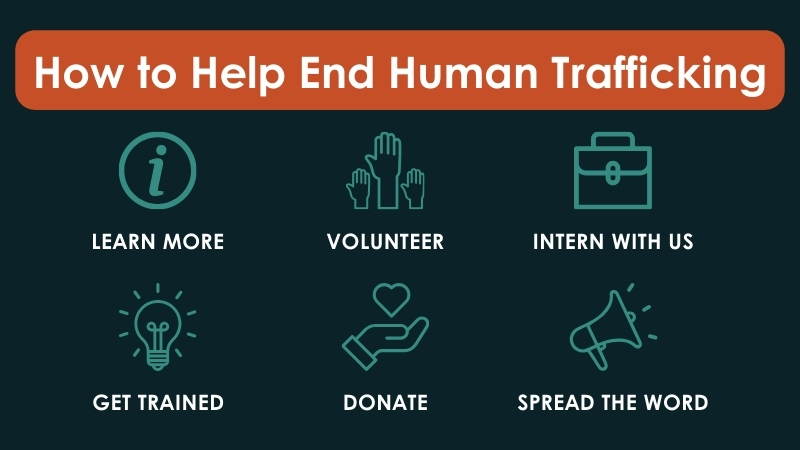The New Year kicks off Human Trafficking Awareness Month, and today (January 11th) is Human Trafficking Awareness Day. It’s an opportunity to spread knowledge about this critical human rights issue and help others learn the facts about this often misunderstood crime.
Human trafficking is a severe form of exploitation for labor (including sex) involving force, fraud, or coercion. It can impact individuals from a range of diverse backgrounds and identities. It occurs across Colorado, in both urban and rural areas and in a variety of settings and sectors.
Kara Napolitano, our Research and Training Manager, spoke at our Amplify Live Event last month. Watch this video to learn more about the common misconceptions of human trafficking—and what it actually looks like in our state.
The more we know about human trafficking, the better we can stop this crime. As we begin 2024, we sat down with our Co-Founder and Executive Director, Amanda Finger, about where the anti-trafficking movement is heading this year and what developments she is most excited about.

What does the big picture of Colorado’s anti-trafficking movement look like in 2024?
“We know globally that exploitation has been increasing. We see glimpses of this in Colorado, with more prosecutions as well as calls to our 24/7 Human Trafficking Hotline. This is a critical time for anti-trafficking advocates to shore up their responses, and for partnerships to take a more in-depth look at their goals and actions ahead.
Nearly 20 anti-trafficking partnerships across the state are working to bring awareness, services and more coordinated responses to their communities, but we know they face many challenges, such as the following:
1. Housing instability and homelessness remain a top challenge for survivors of human trafficking in Colorado and the systems that serve them. Housing is the number one project that anti-trafficking partnerships said that they would implement to decrease human trafficking if resources were not an issue. Calls to our Hotline, made by both service providers and survivors, consistently emphasize that the most pressing need is for safe shelter and housing.
I am hopeful that we will continue to hear more from direct service providers around the intersections of exploitation and homelessness and housing insecurity, especially as urban and rural governments prioritize meetings on the housing crisis across the state.
2. Marginalized groups including immigrant and tribal communities, individuals who hold LGBTQ+ identities, and youth experiencing homelessness continue to be more vulnerable to exploitation in Colorado. While many partnerships work to bring awareness and training to their communities, leaders from these communities are often missing from the decision-making tables. Many of these partnerships are volunteer-led and facing myriad community challenges in addition to human trafficking.
However, there are promising efforts to provide more resources and training to rural areas. For example, LCHT staff continue to partner with the Colorado Division of Child Welfare to deliver trainings to case workers across the state. Also, Governor’s Colorado Human Trafficking Council staff are implementing a federal grant to standardize training for Multi-Disciplinary Teams in Colorado to improve responses for at-risk and exploited youth.”

Amanda speaking at The Colorado Project 2023 Release Party in October 2023
What goals does the Laboratory to Combat Human Trafficking have for the year ahead?
“This year, we are excited to continue to share The Colorado Project 2023 findings and amplify the Action Plan. Every five years or so, LCHT aims to interview as many partners as possible across the state who are addressing human trafficking. These rich data provide an in-depth snapshot of our strengths in preventing and responding to human trafficking and make recommendations for the major challenges ahead that we need to prioritize in Colorado.
Because we think this global issue is really best understood at the local level, we take the research findings back to the communities that participated in interviews, focus groups, and surveys. Sharing insights from the research, continuing community dialogue, and partnering with leaders across Colorado to improve our state’s response to human trafficking are some of LCHT’s top priorities in 2024.
We also want to focus specifically on conversations around the root causes of human trafficking. What are the conditions in our Colorado communities that cause human trafficking to occur? Specifically, we are interested in better understanding challenges facing immigrant and LGBTQ+ communities. Individuals with these identities continue to face exploitation at higher rates in Colorado. We believe it is important to understand why and how we can do more to prevent exploitation. In 2024, we will be partnering with local organizations to lead four of these community conversations in rural and urban areas throughout the state.
Finally, this year, we will prioritize awareness and action around labor exploitation. With the changing demographics of Colorado, and an increasing state and national focus on labor exploitation, we are prioritizing more training and events in 2024 to bring awareness about labor rights and resources to various communities. In partnership with direct service and legal providers, wage and labor experts, we are collectively working to increase awareness of resources and legal rights to central mountain communities as well as southern Colorado.”

What’s new, different, or unique about LCHT programs this year?
“We are excited to continue progress toward ending exploitation through LCHT’s four programs in 2024. A few highlights I’m especially excited about include:
- Organizing and hosting a special train-the-trainer event for leaders in Colorado’s healthcare sector through our Training and Education Program
- Expanding and improving the resources available for survivors across the state on Colorado’s Human Trafficking Hotline and through our Online Resource Directory
- Releasing seven regional profile reports related to The Colorado Project 2023 Report and Action Plan that provide tailored data and insight for areas around the state
- Continuing to offer scholarships to participants in our Leadership Development Program who are seeking to develop their leadership skills and participation in anti-trafficking
I’m especially proud of the ways we are continuing to expand our engagement with survivors as partners. We can always do more as an organization to incorporate guidance from those with lived experience, as well as elevate voices of survivors in a thoughtful and supportive way.
I thought our end-of-year Amplify event was a great illustration of highlighting important stories and the learning that is urgently needed to improve our responses to exploitation from those who know best.” Did we miss you at Amplify? Watch the YouTube video of our conversation with author and survivor leader, Jesse Leon.

Laboratory to Combat Human Trafficking team members at our Amplify Live Event in December 2023
What are you most excited about for the year ahead?
“Personally, I am really excited about our team at the Laboratory to Combat Human Trafficking. We’re growing, and we are expanding our partnership efforts around the state. Our staff members are amazing individuals who are passionate about the work they do, day in and day out.
We are also about to add many new board members, providing more diverse perspectives and important leadership. Starting a new year with a team that is motivated to take on new challenges sustains me and gives me hope and excitement for the change ahead that we seek to make in our communities.”
YOU are an important part of our extended team working to end human trafficking in Colorado. Thank you for being here. We’re excited for the change we’ll make together in 2024!

How to Help End Human Trafficking in Colorado in 2024
Do you want to get more involved in Colorado’s anti-trafficking movement this year? Find a way to advance progress in 2024:
- LEARN MORE. Read about the common human trafficking myths and misconceptions—and what this crime actually looks like in Colorado.
- VOLUNTEER. Field calls and texts to Colorado’s 24/7 Human Trafficking Hotline and connect individuals with the resources they need.
- INTERN WITH US. Participate in our Leadership Development Program to gain experience in human rights, advocacy, management, fundraising, research, and more.
- GET TRAINED. Prepare your team to identify and respond to the signs of human trafficking in your workplace with a training session or series.
- DONATE. Strengthen anti-trafficking efforts in Colorado and beyond. Make a life-changing difference for survivors and make our communities safer.
- SPREAD THE WORD Forward this blog post to someone you know! Spread awareness about this important human rights issue.
